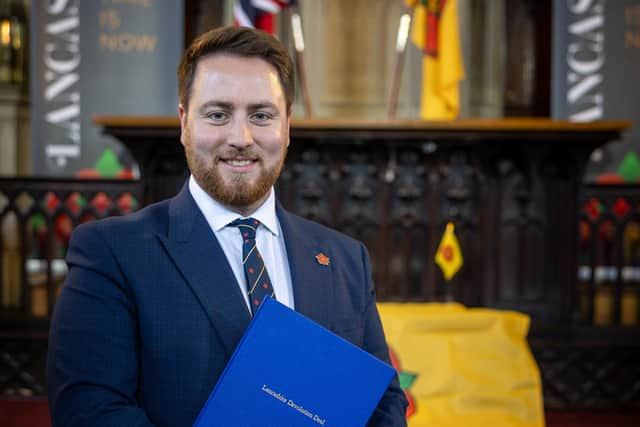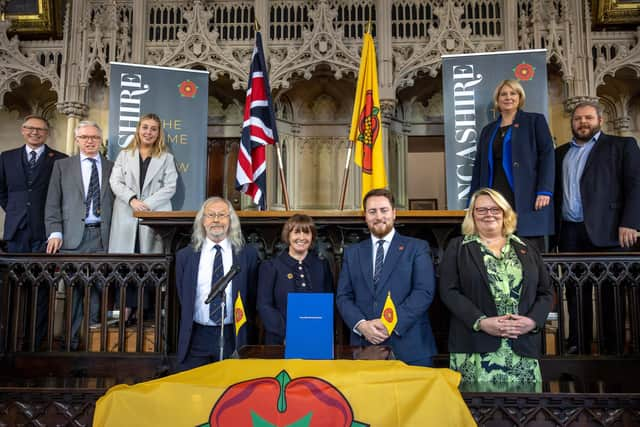Lancashire devolution deal signed in 'milestone' moment at Lancaster Castle on the eve of Lancashire Day
and live on Freeview channel 276
While the agreement will not officially be finalised until it has been approved by the three top-tier councils whose leaders negotiated it – and not until a public consultation has been completed – the moment marks, in principle at least, the completion of a deal that has been seven years in the making. That is how long Lancashire had been attempting to agree a blueprint for devolution amongst its own constituent parts – even before finally sitting down to thrash out the details with the government earlier this year.
However, the tortuous – and occasionally torturous – route to a deal for Lancashire was consigned to history on Sunday with three words and a stroke of the government pen. Levelling Up Minister Jacob Young simply declared: “There we go” as he put his name to a document, some of whose other signatories confessed to thinking might never see the light of day.
Advertisement
Hide AdAdvertisement
Hide AdIn doing so, he confirmed the so-called “level 2” devolution deal announced as part of last week’s autumn statement. which will see Lancashire handed control of the adult education budget for the county, some strategic transport and compulsory purchase order powers and £20m for investment in “innovation-led growth” projects linked to carbon reduction schemes and the arrival of the National Cyber Force HQ in Samlesbury in 2025.
![[From left] Blackburn with Darwen Council leader Phil Riley, Lancashire County Council leader Phillippa Williamson, Levelling Up Minister Jacob Young and Blackpool Council leader Lynn Williams after the devolution deal was signed at Lancaster Castle (image: Martin Bostock Photography)](https://www.blackpoolgazette.co.uk/webimg/b25lY21zOmFhMmY0MDcyLTBkNGItNDJhMy05OGE2LTdhMmQ1MWQwZGQ2Mjo0YmY3ZTQ4OS1lYTc1LTQxMDItODQ5Mi1hMzViMmYxMWNhZjQ=.jpg?crop=3:2,smart&width=640&quality=65)
![[From left] Blackburn with Darwen Council leader Phil Riley, Lancashire County Council leader Phillippa Williamson, Levelling Up Minister Jacob Young and Blackpool Council leader Lynn Williams after the devolution deal was signed at Lancaster Castle (image: Martin Bostock Photography)](/img/placeholder.png)
Mr. Young described the agreement – signed on the eve of Lancashire Day – as a “landmark devolution deal”, adding: “Lancashire is a truly special part of our country. It’s always been a fiercely independent county founded on the community, industry and ingenuity of its people.
“In that spirit, it’s fitting that we meet here at Lancashire Castle, built a millennium ago as one of the most powerful fortresses in England, in one of England’s most powerful counties.
“This government is committed to unleashing Lancashire’s proud spirit and huge potential, building on [its] strengths as a trailblazer in technological innovation, as the home of Europe’s biggest aerospace industry and – looking to the future – as a centre of low-carbon energy, life sciences and artificial intelligence.
Advertisement
Hide AdAdvertisement
Hide Ad“The key to Lancashire’s future ultimately lies in devolving more power from Westminster, giving local leaders who know and love this county best the money and powers that they need to unleash economic growth.”


The ceremony, which took place in the castle’s Shire Hall, revolved around the trio of upper-tier authorities – Lancashire County Council, Blackpool Council and Blackburn with Darwen Council – that had been charged by the government back in May with striking a deal on a turbocharged timetable, which stood in contrast to the years of delay that had gone before.
However. as the Local Democracy Reporting Service (LDRS) revealed last week, several of Lancashire’s Labour district council leaders – or formerly Labour, in Burnley’s case – have criticised the agreement for, as they see it, not being ambitious enough and for not giving all 12 district authorities a place on the combined county authority (CCA) being created to oversee the newly-devolved powers. Instead, two district representatives will sit on the body as non-constituent members – and without a vote.
Only four of the dozen district leaders attended the event: three Conservatives – from Fylde, Ribble Valley and Wyre, with the latter’s Michael Vincent being the only borough leader to comment positively after the deal was announced last week – and one Labour, Lancaster City Council’s Phillip Black, who called the settlement “underwhelming”.
Advertisement
Hide AdAdvertisement
Hide AdHowever, the Conservative leader of Lancashire County Council, Phillippa Williamson, insisted that it had been a “cross-party” endeavour that encompassed “all the political interests of Lancashire” – and her negotiating partners, Blackpool and Blackburn councils, are both Labour controlled.


She also heralded the agreement as “a great deal for Lancashire” and thanked those with an interest in seeing it happen for “keeping faith with Lancashire and [its] politicians – because we got there in the end”.
“We have a great story to tell – :Lancashire already makes a major contribution and offers enormous potential to UK PLC. But we are ambitious for much more and this deal will enable us to do much more.
“It gives us the tools to drive economic growth, to create the conditions for inward investment and raise the profile of Lancashire. .We’ll not only grow our economy, we’ll tackle the issues that matter most to the people in :Lancashire – and match the ambition of those who live here, those who work here [and] those who do business here.
Advertisement
Hide AdAdvertisement
Hide Ad“Signing this document is more than just a formality, it is a hugely significant milestone for us all,” said County Cllr Williamson, adding that the deal put “the interests of residents and businesses first”.
Blackpool Council leader Lynn Williams told the 100-strong audience that concessions had been required on all sides – and expressed her gratitude for what she described as a “unique” feature of the deal that will allow her authority to keep control of its publicly-owned trams and buses, which she said was “fundamental” to the town.
She added: “This hasn’t been an easy journey…but Lancashire has most definitely made progress that many, including myself, if I’m entirely honest, never thought they would see. We worked together and made compromises, because devolution matters for all of Lancashire.
“We could wait until the end of time for the prefect solution, but our residents and businesses deserve progress now, [which is] why we should take this opportunity and move forward,” Cllr Williams said.
Advertisement
Hide AdAdvertisement
Hide AdShe especially championed gaining local control over adult education, stating that it would enable the county to “support new jobs in growing industries such as low carbon technologies”.
“We want to take advantage [of] harnessing our local resources,” Cllr Williams explained, joking that Blackpool prom is known for “very special wind”.
Meanwhile – and to similar ripples of amusement – Blackburn leader Phil Riley announced his intention to quote Chinese Communist leader Chairman Mao.
“One of the more helpful things he said is that every long journey is a first step - and that’s what this [deal] is. There will be more to come and that’s really the challenge.
Advertisement
Hide AdAdvertisement
Hide Ad“So the comparison is not between where are today in Lancashire and where Andy Burnham is in Manchester – it’s much about where we are now and where Manchester was many years ago,” he said.
Cllr Riley added that Blackburn – and Lancashire more widely – “makes things”, a propensity he said was embodied by the seven-year-old whom Jacob Young had met on a visit to Blackburn earlier in the day. She had started her own business by borrowing £20 from her mum and then reinvesting the profits.
“This [attitude] is what we want to foster,” he said.
A MAYOR IS A MUST IF LANCASHIRE WANTS IT ALL, MINISTER SAYS
Speaking after the ceremony, Levelling Up Minister Jacob Young told the LDRS that he believed Lancashire had got “the best deal” for itself in acquiring the powers that he had travelled to the county to hand over.
However, he said that if it wanted more control, the government “stand[s] ready to work with Lancashire to deepen devolution” – echoing a commitment made within the deal document itself, which the top-tier councils seem keen to pursue at some point. But when pressed on whether that meant expanding the scope of the level 2 agreement or moving up to the top level 3, Mr. Young made it clear that the latter move would require the county to agree to an elected mayor.
Advertisement
Hide AdAdvertisement
Hide AdThat much is government policy, but the question of whether getting more power makes a mayor worthwhile has been one of the major stumbling blocks that has prevented Lancashire’s leaders from agreeing amongst themselves over devolution for so long. Just last week, South Ribble Borough Council leader Paul Foster called for a referendum on an elected mayor to see whether residents would accept one in return for what he said would be a better deal.
However, pressed on whether Lancashire could at some point secure the most extensive deal without that mayoral figurehead – if it was deemed to have made a success of its level 2 agreement – the minister was resolute.
“A level 3 devolution deal comes with a mayor, but it’s not for me, as someone who isn’t local to Lancashire, to come here and say Lancashire has to have a mayor. It’s for the people of Lancashire whether or not they want to take that step to level 3.
“This is how devolution works – we want devolution to be meaningful for areas, but we also need it to be simple as well. We can’t have bespoke deals up and down the country, so that’s why we’ve got a devolution framework which sets out what comes with the level 2 deal and what comes with the level 3 deal,” Mr. Young said.
Advertisement
Hide AdAdvertisement
Hide AdHe added that it was a success for Lancashire just to have got “a deal over the line”, but said that continuing to see “economic growth” and “investment in the new technologies of the future” would be the true hallmark of a deal well executed.
‘WE WANT TO KNOW WHAT PEOPLE THINK’
Lancashire County Council leader Phillippa Williamson has moved to reassure residents that the deal signing ceremony did not mean that they would be denied a say on the agreement.
The in-principle proposal is due to be ratified during council meetings at County Hall and at Blackpool and Blackburn with Darwen councils this coming week. If it is approved by all three, a public consultation will then open on 1st December and run for two months.
“We want it to be a lengthy, meaningful and engaging consultation process and I’d encourage people to get involved.
Advertisement
Hide AdAdvertisement
Hide Ad“[The] feedback that we get…may refine or shape the deal further and then we will go back to government and ask them to implement it,” County Cllr Williamson explained.
She also sought to soothe district fears over their role in the new combined county authority (CCA).
“[They] will be an integral part of [it] when it’s set up. They’ll be working with us on all the projects we’re looking to be able to develop…so they have lots of influence and a voice on what the CCA will do.
“We’re not taking stuff away from them – we’re taking powers and influence and funding from government.”
Advertisement
Hide AdAdvertisement
Hide AdAcknowledging that she wondered whether the day would ever come when Lancashire struck a deal, she added: “It enables us to have a direct conversation with government – it brings down powers and funding from Whitehall that we don’t have access to now and it means we can start influencing things much more directly across the county.”